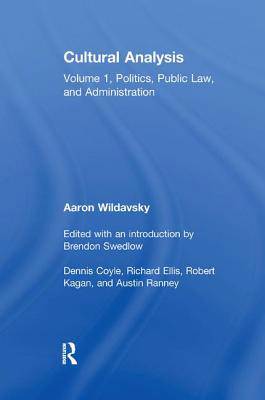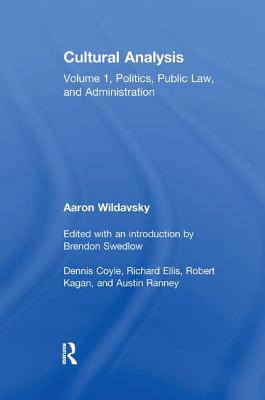
- Afhalen na 1 uur in een winkel met voorraad
- Gratis thuislevering in België vanaf € 30
- Ruim aanbod met 7 miljoen producten
- Afhalen na 1 uur in een winkel met voorraad
- Gratis thuislevering in België vanaf € 30
- Ruim aanbod met 7 miljoen producten
Zoeken
Cultural Analysis
Volume 1, Politics, Public Law, and Administration
Aaron Wildavsky
Paperback | Engels
€ 62,45
+ 124 punten
Uitvoering
Omschrijving
As a result of a lifetime of incomparably wide-ranging investigations, Aaron Wildavsky concluded that politics in the United States and elsewhere was a patterned activity, exhibiting recurring regularities. Political values, beliefs, and institutions were neither endlessly varied, nor haphazardly organized. They tended to exhibit a limited range of variation, and were organized in discoverable, predictable ways. In Cultural Analysis, the fourth collection of his essays posthumously published by Transaction, Wildavsky argues that American politics, public law, and public administration are the contested terrain of rival, inescapable political cultures.Analysts of American politics distinguish liberals from conservatives and Democrats from Republicans, but do not explain how these categories of political allegiance develop, maintain themselves, or change. Wildavsky offers a cultural-functional explanation for ideological and partisan coherence and realignment. Wildavsky also felt that these dualisms did not adequately capture the ideological and partisan variation he observed on the political landscape. Like others, he detected another recurring strain of political allegiance: that of classical liberalism or libertarianism. People of this political stripe valued freedom more than equality (the primary political value of contemporary liberals), and also more than order, the primary political value of conservatives.The value of Wildavsky's reconceptualization of the ideological and social foundations of political conflict, compromise, and coalition is assessed here by Wildavsky's former colleagues and students at the University of California, Berkeley: Dennis Coyle, Richard Ellis, Robert Kagan, Austin Ranney, and Brendon Swedlow.
Specificaties
Betrokkenen
- Auteur(s):
- Uitgeverij:
Inhoud
- Aantal bladzijden:
- 455
- Taal:
- Engels
Eigenschappen
- Productcode (EAN):
- 9781138508835
- Verschijningsdatum:
- 15/11/2017
- Uitvoering:
- Paperback
- Formaat:
- Trade paperback (VS)
- Afmetingen:
- 152 mm x 229 mm
- Gewicht:
- 452 g

Alleen bij Standaard Boekhandel
+ 124 punten op je klantenkaart van Standaard Boekhandel
Beoordelingen
We publiceren alleen reviews die voldoen aan de voorwaarden voor reviews. Bekijk onze voorwaarden voor reviews.











